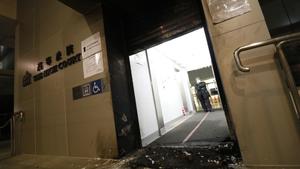 Charred debris is left at an entrance of the High Court building after an arson attack by rioters on Dec 8, 2019. (PROVIDED TO CHINA DAILY)
Charred debris is left at an entrance of the High Court building after an arson attack by rioters on Dec 8, 2019. (PROVIDED TO CHINA DAILY)
Paul Tse Wai-chun, a legislator and a lawyer, is saddened that the rule of law and judicial independence — Hong Kong’s core values — are now under serious threat.
In the past, verbal abuse directed at court rulings and judges have occurred, but now the city has experienced wanton violence, including throwing gasoline bombs and committing arson outside court buildings.
Arson is a very serious offense but very few people know the maximum penalty for it is life imprisonment — the same as murder
Paul Tse Wai-chun,
legislator and lawyer
“Once serious violence has started, it is hard for it to recede,” Tse told China Daily. “Arson is a very serious offense but very few people know the maximum penalty for it is life imprisonment — the same as murder.”
While society at large, the Hong Kong Bar Association and Law Society of Hong Kong condemn violence targeting the courts, legal constituency lawmaker Dennis Kwok Wing-hang seems unconcerned about it, Tse said.
Kwok simply “regretted’’ such unlawful acts and then blamed the government.
“As a barrister and a lawmaker, he (Kwok) is expected to safeguard the rule of law and encourage people to respect the rule of law. But it is deplorable he has not fulfilled his duties for political reasons. He is definitely calculating that in the current political atmosphere, he will not lose support for the things he does,” Tse said.
“Kwok often ignores the proper (Legislative Council) procedures — such as the election of the House Committee chairman.
“He is putting politics above the rule of law. This will backfire if he claims to safeguard rule of the law; people will question what he has said and done.”
Tse said Kwok was also the main person mounting a legal challenge to the Emergency Regulations Ordinance and the anti-mask law.
The government lost the initial battle after the Court of First Instance ruled that both were inconsistent with the Basic Law. The government then lodged an appeal, which was heard last week; the verdict is expected to be delivered soon.
Tse said that Kwok had asked the government not to appeal. “This is a typical example of double standards,” Tse said, adding that it is against the spirit of justice, as both parties are entitled to appeal.
Discussing the ERO, Tse said it was essential to retain such a law because every government needed special powers to handle emergencies.
He believes the opposition camp selectively obeys the law. For example, when Super Typhoon Mangkhut swept through Hong Kong in September 2018, they asked the government to invoke the emergency ordinance so working people would not have to go to work.
“It is oversimplified and dogmatic to argue that laws enacted before 1997 are not applicable after reunification (with China). I hope the Court of Final Appeal will hear this case to sort out these disputes.
“I guess the Standing Committee of the National People’s Congress will, in the end, interpret the relevant Basic Law provisions, because the NPCSC inspected all Hong Kong laws and declared that laws inconsistent with the Basic Law would become invalid after 1997. The ERO was not declared invalid, so it is still valid today,” he said.
Tse said Kwok had visited the United States several times and he often boasted about his role in the passing of the so-called Hong Kong Human Rights and Democracy Act there.
“He has encouraged the US to sanction Hong Kong,” Tse said. “If the Basic Law’s Article 23 were enacted, he might be guilty of treason because that harms the interests of Hong Kong and the country as a whole,” he added.


